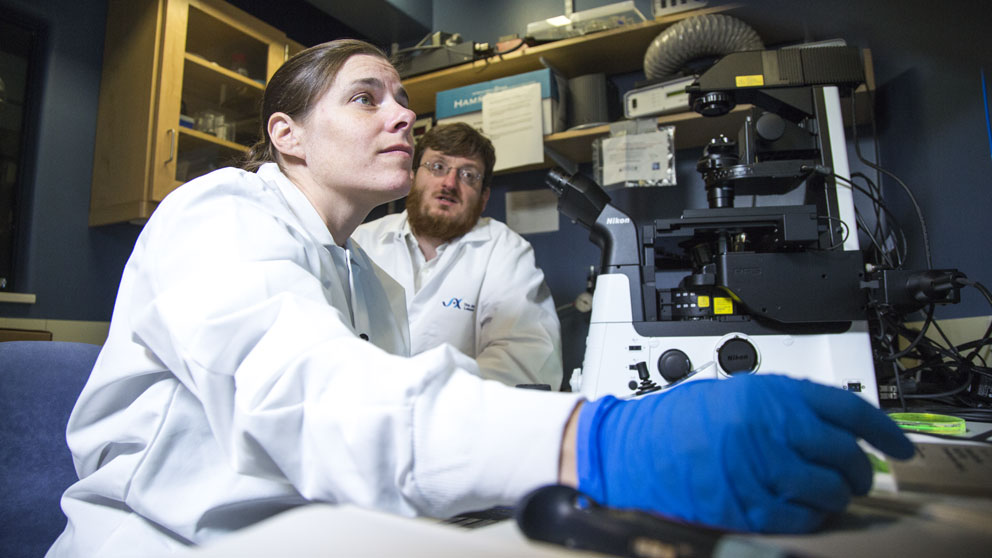
Alzheimer's researcher Catherine Kaczorowski and Senior Microscopy Scientist Philipp Henrich examine slide samples from Kaczorowski's research. JAX photo by Tiffany Laufer.
National Institute on Aging makes $6.8 million grant for JAX research in cognitive aging
Picture an assembly in an elementary-school gym, with 100 kindergarteners squirming on folding metal chairs. What if you could sequence their genomes and then follow them through adulthood to find the 10 individuals who will develop Alzheimer’s disease by age 65? Unfortunately, a longitudinal study like this would take about 60 years, and would not help the kids at risk for Alzheimer’s.
has a better way.
The Jackson Laboratory (JAX) associate professor and Evnin Family Chair in Alzheimer’s Research is launching a longitudinal study of hundreds of individuals to identify genetic variations that increase susceptibility or resistance to Alzheimer’s disease. But these individuals are from special mouse populations, and unlike tracking those kindergarteners throughout their lifespan, it will take only five years.
“Alzheimer’s disease takes a terrible toll on society, families and patients,” Kaczorowski says. “If we can identify the genetic factors and mechanisms involved in normal cognitive aging and that lead to that pathologic brain aging, we can design new therapeutic strategies for people at risk for the disease, ideally before symptoms even appear.”
The National Institute on Aging has made a five-year grant of $6,758,815 to Kaczorowski for this project; this is exceptional because the funding is provided up-front rather than spread out over the grant period per the usual practice.
Together with Vivek Philip, JAX associate director of computational sciences, and other experts in and beyond JAX, Kaczorowski is conducting the first comprehensive analysis of what causes normal human cognitive aging using Diversity Outbred (DO) mice, which mimic the genetic and physiological variation found in human populations.
As the mice age, the researchers will track the onset and severity of cognitive aging, and identify which genes promote healthy brain aging (resilience), as well as those associated with a negative shift toward Alzheimer’s-like symptoms. They will compare these gene candidates with data from human cohorts, to validate their potential as new therapies.
Kaczorowski’s collaborators include Tim Hohman of Vanderbilt University, who will compare mouse and human genes necessary for translation; Mike MacCoss of the University of Washington, an expert in how gene variants impact protein expression — what Kaczorowski describes as “the actual worker bees of the brain”; and Jeremy Herskowitz of the University of Alabama, Birmingham, who will establish how therapeutic gene candidates maintain communication among neurons — the fundamental mechanism of resilience to Alzheimer’s disease.
National Institute on Aging, Grant Number 1RF1AG063755-01: Systems Genetic Analysis of Cognitive Resilience Using Multi-Parent Crosses